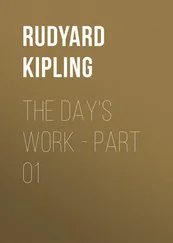She went, trailing a fathom of weed behind her. From a slow two knots an hour she crawled up to a triumphant four. Anything beyond that made the struts quiver dangerously, and filled the engine–room with steam. Morning showed her out of sight of land, and there was a visible ripple under her bows; but she complained bitterly in her bowels, and, as though the noise had called it, there shot along across the purple sea a swift, dark proa, hawk–like and curious, which presently ranged alongside and wished to know if the Haliotis were helpless. Ships, even the steamers of the white men, had been known to break down in those waters, and the honest Malay and Javanese traders would sometimes aid them in their own peculiar way. But this ship was not full of lady passengers and well–dressed officers. Men, white, naked and savage, swarmed down her sides—some with red–hot iron bars, and others with large hammers—threw themselves upon those innocent inquiring strangers, and, before any man could say what had happened, were in full possession of the proa, while the lawful owners bobbed in the water overside. Half an hour later the proa's cargo of sago and trepang, as well as a doubtful–minded compass, was in the Haliotis. The two huge triangular mat sails, with their seventy–foot yards and booms, had followed the cargo, and were being fitted to the stripped masts of the steamer.
They rose, they swelled, they filled, and the empty steamer visibly laid over as the wind took them. They gave her nearly three knots an hour, and what better could men ask? But if she had been forlorn before, this new purchase made her horrible to see. Imagine a respectable charwoman in the tights of a ballet–dancer rolling drunk along the streets, and you will come to some faint notion of the appearance of that nine–hundred–ton, well–decked, once schooner–rigged cargo–boat as she staggered under her new help, shouting and raving across the deep. With steam and sail that marvellous voyage continued; and the bright–eyed crew looked over the rail, desolate, unkempt, unshorn, shamelessly clothed beyond the decencies.
At the end of the third week she sighted the island of Pygang–Watai, whose harbour is the turning–point of a pearl sea–patrol. Here the gun–boats stay for a week ere they retrace their line. There is no village at Pygang–Watai; only a stream of water, some palms, and a harbour safe to rest in till the first violence of the southeast monsoon has blown itself out.
They opened up the low coral beach, with its mound of whitewashed coal ready for supply, the deserted huts for the sailors, and the flagless flagstaff.
Next day there was no Haliotis—only a little proa rocking in the warm rain at the mouth of the harbour, whose crew watched with hungry eyes the smoke of a gunboat on the horizon.
Months afterwards there were a few lines in an English newspaper to the effect that some gunboat of some foreign Power had broken her back at the mouth of some far–away harbour by running at full speed into a sunken wreck.
I have done one braver thing
Than all the worthies did;
And yet a braver thence doth spring,
Which is to keep that hid.
The Undertaking.
"Is it officially declared yet?"
"They've gone as far as to admit 'extreme local scarcity,' and they've started relief–works in one or two districts, the paper says."
"That means it will be declared as soon as they can make sure of the men and the rolling–stock. Shouldn't wonder if it were as bad as the '78 Famine."
"'Can't be," said Scott, turning a little in the long cane chair.
"We've had fifteen–anna crops in the north, and Bombay and Bengal report more than they know what to do with. They'll be able to check it before it gets out of hand. It will only be local."
Martyn picked the "Pioneer" from the table, read through the telegrams once more, and put up his feet on the chair–rests. It was a hot, dark, breathless evening, heavy with the smell of the newly watered Mall. The flowers in the Club gardens were dead and black on their stalks, the little lotus–pond was a circle of caked mud, and the tamarisk–trees were white with the dust of weeks. Most of the men were at the band–stand in the public gardens—from the Club verandah you could hear the native Police band hammering stale waltzes—or on the polo–ground, or in the high–walled fives–court, hotter than a Dutch oven. Half a dozen grooms, squatted at the heads of their ponies, waited their masters' return. From time to time a man would ride at a foot–pace into the Club compound, and listlessly loaf over to the whitewashed barracks beside the main building. These were supposed to be chambers. Men lived in them, meeting the same white faces night after night at dinner, and drawing out their office–work till the latest possible hour, that they might escape that doleful company.
"What are you going to do?" said Martyn, with a yawn. "Let's have a swim before dinner."
"Water's hot. I was at the bath to–day."
"Play you game o' billiards—fifty up."
"It's a hundred and five in the hall now. Sit still and don't be so abominably energetic."
A grunting camel swung up to the porch, his badged and belted rider fumbling a leather pouch.
"Kubber–kargaz–ki–yektraaa," the man whined, handing down the newspaper extra—a slip printed on one side only, and damp from the press. It was pinned up on the green–baize board, between notices of ponies for sale and fox–terriers missing.
Martyn rose lazily, read it, and whistled. "It's declared!" he cried. "One, two, three—eight districts go under the operations of the Famine Code ek dum. They've put Jimmy Hawkins in charge."
"Good business!" said Scott, with the first sign of interest he had shown. "When in doubt hire a Punjabi. I worked under Jimmy when I first came out and he belonged to the Punjab. He has more bundobust than most men."
"Jimmy's a Jubilee Knight now," said Martyn. "He's a good chap, even though he is a thrice–born civilian and went to the Benighted Presidency. What unholy names these Madras districts rejoice in—all ungas or rungas or pillays or polliums!"
A dog–cart drove up in the dusk, and a man entered, mopping his head. He was editor of the one daily paper at the capital of a Province of twenty–five million natives and a few hundred white men: as his staff was limited to himself and one assistant, his office–hours ran variously from ten to twenty a day.
"Hi, Raines; you're supposed to know everything," said Martyn, stopping him. "How's this Madras 'scarcity' going to turn out?"
"No one knows as yet. There's a message as long as your arm coming in on the telephone. I've left my cub to fill it out. Madras has owned she can't manage it alone, and Jimmy seems to have a free hand in getting all the men he needs. Arbuthnot's warned to hold himself in readiness."
"'Badger' Arbuthnot?"
"The Peshawur chap. Yes: and the Pi wires that Ellis and Clay have been moved from the Northwest already, and they've taken half a dozen Bombay men, too. It's pukka famine, by the looks of it."
"They're nearer the scene of action than we are; but if it comes to indenting on the Punjab this early, there's more in this than meets the eye," said Martyn.
"Here to–day and gone to–morrow. 'Didn't come to stay for ever," said Scott, dropping one of Marryat's novels, and rising to his feet. "Martyn, your sister's waiting for you."
A rough grey horse was backing and shifting at the edge of the verandah, where the light of a kerosene lamp fell on a brown–calico habit and a white face under a grey–felt hat.
"Right, O!" said Martyn. "I'm ready. Better come and dine with us, if you've nothing to do, Scott. William, is there any dinner in the house?"
Читать дальше












